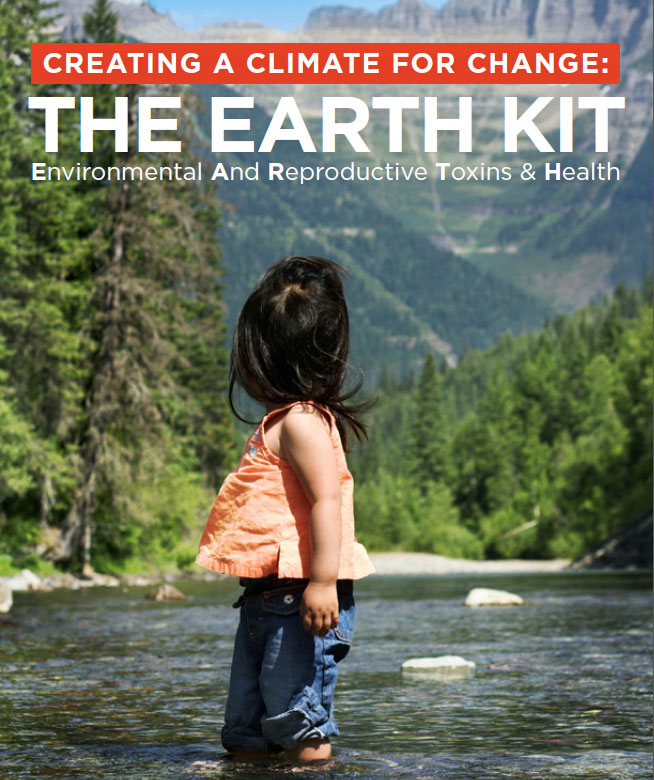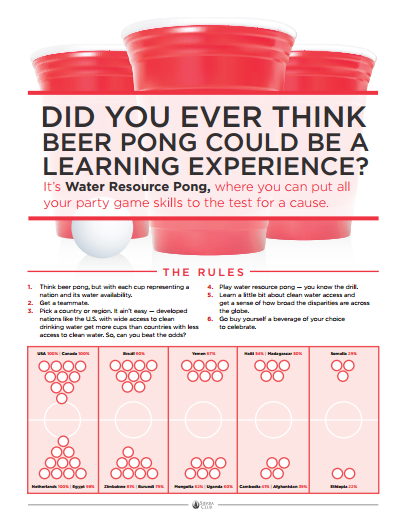Factsheets, Infographics & Reports
Download our program brochure to learn more about the Gender, Equity & Environment Program
Download our global gender equity and clean energy access factsheet to learn how gender impacts energy access.
Download our chlorpyrofos fact sheet to learn more about the chemical's impact on children.
Download the rules to Water Resource Pong to put all your party game skills to the test for a cause.

Creating a Climate for Change: The EARTH Kit
Exploring the links between environmental and reproductive health and justice.
Women and Climate Disruption Infographic

Sunscreen's Synthetics and your Sexual Health
There's a lot to consider when seeking out a sunscreen that's safe for both your reproductive health and your largest organ, your skin. Get some tips to help you navigate the sunscreen aisle.
Breaking the Cycle: Women, Water, and the Search for Equity
Created in partnership with the Feminist Majority Foundation and the Women's Environment and Development Organization (WEDO), this fact sheet explores the links between women, water access, and gender equity.
{C}{C}{C}The Millennium Development Goals: 8 Steps for a Sustainable Future
This 12-page fact sheet explores the connections between the 8 MDGs and how each relates to global health and the environment.
PARTNERS' RESOURCES
Website

Women at the Center connects the dots between women's reproductive health and rights, and a sustainable future for our families and communities.
Infographics
Creating a Sustainable Future: Women at the Center Click image to see infographic at full size. Image courtesy of Resource Media. Read more about the benefits of putting women at the center for healther mothers and a healthier mother earth.
Save Money, Save the Planet Energy efficiency ideas which make economic sense and protect the planet!
Films
From Population Action International:
- Weathering Change: A brief documentary about four women in Ethiopia, Nepal and Peru who struggle to care for their families, while also facing the challenges of crop failures and water scarcity. The film demonstrates how family planning, girls’ education, sustainable agriculture and environmental conservation are part of the solution.
- Dollars and Sense: The Case for Contraception: Over 222 million women want access to modern contraception, but can't get it. With a commitment of $1 billion dollars towards comprehensive reproductive health services, more than 1 million lives could be saved. Lives and money could be saved by investing in family planning, this short film shows how.
From the Wilson Center:
- Healthy People, Healthy Environment: "Along the northern coast of Tanzania, an innovative approach to development combines efforts to conserve natural resources with reproductive health services and sustainable economic opportunities. In Healthy People, Healthy Environment, three women from the Pangani and Bagamoyo districts --Rukia, Mahija, and Fidea -- show how these integrated population, health, and environment (PHE) projects empower them to help their families, their communities, and their environment."
- Scaling the Mountain: "In the foothills of Nepal, extreme deforestation has pushed many rural communities onto marginal lands. In Scaling the Mountain, villagers in Jogimara and Naubise find that combining conservation efforts with reproductive health services helps them support their families and their communities more sustainably."
From The Girl Effect:
- The Girl Effect: Why Girls?: The Girl Effect is a movement that believes in the power and benefit of investing in girls. Investing in girls has a profound ripple effect on her community and subsequently the world.
From National Geographic Magazine:
- 7 Billion: While this 2011 film, part of a year-long series from National Geographic about the world reaching 7 billion, is no longer up-to-date, its message remains pertinent and current. Over the course of the 3-minute film, facts and figures flash across the screen which compare current population numbers with past statistics and future projections.
From Aspen Global Health and Development:
- Family Planning in Malawi: This film takes place in Malawi, a country struggling with the burdens of extreme poverty, resource scarcity, and a rapidly growing population that could triple in size in the next 35 years. We are introduced to Marda and Alfred, a young couple who have had the ability to use family planning to decide how many children to have, and when to have them.
